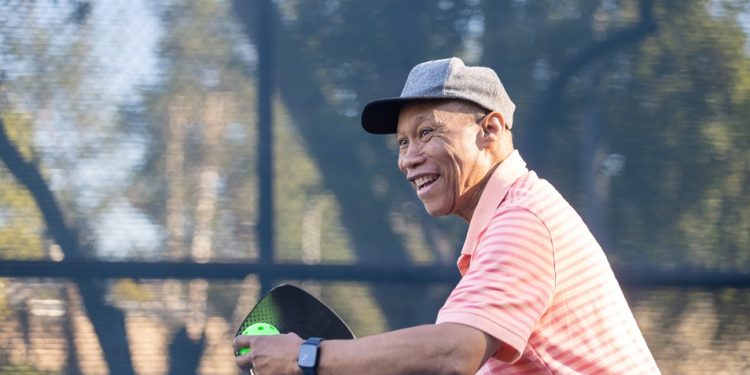DUBOIS – Pickleball is the fastest-growing sport in America, attracting more than 36 million Americans, including the likes of Tom Brady and Lebron James.
A cross between tennis and ping pong that features paddles and a wiffle ball, pickleball is inexpensive and easy to learn, making it the ideal game for people to pick up this spring.
It is also a great way to get cardiovascular exercise, which can improve your memory, decrease risk of stroke, help protect against Alzheimer’s, fight osteoporosis and more.
As the sport’s popularity grows, so has the number of pickleball-related injuries. The Journal of Emergency Medicine estimates nearly 19,000 pickleball injuries per year, with 90 percent of those injuries affecting people age 50 and older.
“While pickleball is easy to pick up, older individuals and people who do not routinely exercise may not be conditioned enough for the sport, and that increases the risk of injury,” said Chad Vorderbrueggen, MS, CPT, TPI Level III, fitness director at Penn Highlands Mon Valley Center for Fitness and Health in Belle Vernon, Pa.
Common pickleball-related injuries
The most common injuries in pickleball involve ankles, knees and the lower back because of the start-stop nature of the game, the quick changes of direction on a small court and the frequent bending up and down to pick up the ball.
Twisted ankles, sprains and strains are all common among recreational pickleball players, as are more serious injuries, such as meniscus tears, Achilles injuries and herniated disks in the lower back.
How to avoid injuries and stay in the game
According to Vorderbrueggen, one of the best ways to avoid injuries is by warming up before you start to play. Create a warmup routine for yourself that you feel comfortable doing before every game.
Your routine should consist of some light jogging and stretching of all the different muscle groups. Give yourself at least five to 10 minutes so you can get your muscles warmed up before the game begins.
Another way to avoid injury is by doing conditioning. By making an effort to stay active outside of pickleball, you can build muscle and decrease your risk of injury.
Try cardio activities such as swimming, biking, hiking or yoga on days that you are not playing pickleball.
Finally, know your limits. Since pickleball attracts players of all ages, it is important for each player to recognize and evaluate their physical limitations. Avoid overdoing it and pay attention to your body, especially if you have a history of injuries.
If you experience an injury while playing pickleball, do not try to jump right back into play. Rest, apply an ice pack for 10 to 20 minutes a couple times a day, wrap the injured area in an elastic bandage and keep it elevated anytime you are sitting or lying down. If symptoms persist or worsen after a few days, seek medical attention.
Pickleball is a great way to get more exercise into your day, and because it is a social sport that is soaring in popularity, you can likely find plenty of opportunities to play near you.
Before beginning any exercise routine, be sure to talk to your doctor.
If you are hurt playing sports, have a mishap in your home or experience any other type of injury, seek treatment as soon as possible.
Depending on the severity of your injury, Penn Highlands Healthcare offers family medical practices throughout Pennsylvania, QCare walk-in clinics in Northwestern/Central Pennsylvania and emergency departments in each of its eight hospitals.
To locate a physician, visit www.phhealthcare.org/doctor and to find a QCare near you, visit www.phhealthcare.org/qcare.




